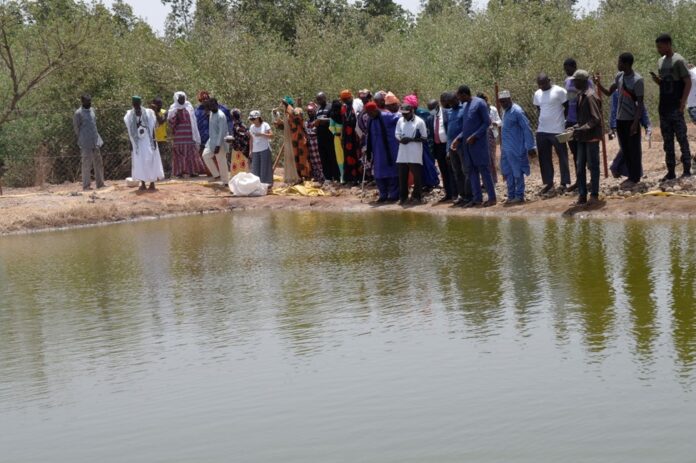By Ndey Sowe
The European Research Institute (ERI) on Monday, May 23, 2022, handed over an over D4 million Aquaculture Facility project to Solicita Federation Women in North Bank Region (NBR).
The event, attended by the beneficiaries, Governor of NBR, representative of the EU, project partners, and officials from agriculture sector, was held at the Aquaculture Site in Kerewan Riverside, NBR.
The project was co-funded by the European Union under Circular Economy in Sustainable Agricultural Development (CESAD).
The CESAD Project is implemented by ERI in partnership with the Agency for Development of Women and Children (ADWAC) and the Njawara Agricultural Training Centre (NATC).
Evangelina Blanco, Program Officer of the European Union delegation in The Gambia, handed over keys to the store, pond and other materials to Fatou Jagne, president of the Solicita Federation Women.
She received them on behalf of members, while Lamin Saidykhan, Governor of NBR, presided over the event.
Blanco thanked the implementing partners and beneficiaries for inviting the EU, saying it was an honour to be part of the occasion. She explained that the project – CESAD, is part of EU larger program funding in The Gambia.
“It is part of the big project of 20.5million Euros which is a D1.2 billion project called Agriculture for Economic Growth Food Security Nutrition to Mitigate Migration Flows in The Gambia,” she said.
She further said the project is part of the 11th European Development Fund located in The Gambia and the project had three components – one of them is Agriculture for Economic Growth implemented by the FAO; two is School Meals and Disaster Risk Management carried out by the WFP, while three is the NGO component implemented by the NGOs through ActionAid, Action Against Hunger, and this CESAD project implementing by the European Research Institute.
According to her, the other program intervention was designed to consider the potentials of the agriculture sector in The Gambia for inclusive growth and also to improve food security in the country and reduce poverty.
The project, she disclosed, recognises some areas of potential improvement in the agriculture sector like larger arable land irrigation, better storage facilities, enhance entrepreneurial culture, improve taxes to market, better food safety and quality control and increases of other produce participation value change and in market among other important areas.
Madam Blanco reminded the gathering of climate change and urged everyone to be aware and consider the last year July 7 windstorms, increase salinity, sea level rise, saying “all of these excesses of climate change have been identified.”
She added that CESAD kicked off on the 29th November 2018, which was supposed to be a three years program, but extended by one year because of the Covid-19 which impacted all aspects of life.
The EU Project Manager dilated on the importance of the aquaculture project, which she said, is very new in The Gambia, while she thanked the EU, ERI, and local partners for continuing giving beneficiaries infrastructure among other things and now full aquaculture facility.
“And we are now handing it over to you to take responsibility, make it work and be sustainable for the betterment of the community,” she said.
Lamin Saidykhan, Governor of NBR, expressed delights about the aquaculture project and thanked the EU for funding the project in extension. He applauded ERI and local partners for the implementation and unflinching support to the region.
Saidykhan described the project as “first of its kind in this region and it will bring a lot of benefits to the people of Kerewan and across the river.”
The governor disclosed that fish is scarce and costly in the markets and this aquaculture project is one of the ways to quickly solve the issue of scarcity of fish and the escalating price.
He, however, appealed for an expansion of the project across and beyond NBR, while urging the beneficiaries to take full responsibility of the project to avoid failure.
Samba Jawo, Local Manager for European Research Institute, called on the beneficiaries to take full ownership of the facility and make it a sustainable venture.
He talked at length on the importance of the project as well as outlined some of the activities which the CESAD project has brought to the region.
Jawo also thanked the EU for funding their activities and expressed gratitude to the local partners.

















